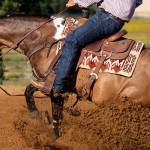Anti-Inflammatory Effects of PRP, Platelet Lysate Examined in Horses

Platelet lysate does not have a direct anti-inflammatory effect when injected directly into inflamed joints with persistent synovitis, according to a new study.* This regenerative therapy may, however, promote tissue repair and therefore alleviate inflammation secondarily.
Persistent synovitis develops following an insult to a joint and can lead to osteoarthritis, which in turn limits performance and often brings about early retirement. Various medications and supplements are used in horses with synovitis to alleviate pain and inflammation.
“In the case of joint supplements, studies show that prophylactic administration of joint supplements has a protective effect on joint tissues. Further, joint supplements containing glucosamine, chondroitin sulfate, and hyaluronic acid may slow the progression of disease, prolonging the time from synovitis to development of osteoarthritis,” explained Kathleen Crandell, Ph.D., a Kentucky Equine Research nutritionist.
Platelet lysate is produced from platelet-rich plasma (PRP) by repeated freeze/thaw cycles. When the platelets lyse (break open) the contents of the platelets are freed and collected. Platelet lysate therefore contains all the important therapeutic PRP “ingredients,” such as growth factors.
“Several studies report positive results of using PRP in promoting tissue repair, but the anti-inflammatory effects of neither PRP nor platelet lysate are known,” Crandell said.
A persistent synovitis was experimentally induced in six healthy Thoroughbred horses. Freshly prepared platelet lysate was then injected three weeks after inducing synovitis in the upper knee (antebrachiocarpal) joint. The joint was injected once weekly for three consecutive weeks. Saline was injected into the contralateral joint as a control. Synovial fluid samples were collected and analyzed at the start of the study before inducing synovitis and again at the time of each injection. Synovial tissue was analyzed microscopically at the end of the study.
Platelet lysate did not have any clear anti-inflammatory effects in this study, as assessed by synovial fluid analysis and evaluation of the synovial tissue directly. This study did, however, find that the lactate dehydrogenase activity in the synovial fluid was significantly lower in samples collected from joints injected with platelet lysate compared to the control at the end of the study (day 44).
“Lactate dehydrogenase is a marker of inflammation because it leaks from inflamed tissues,” Crandell relayed.
According to the research team, “It is possible that the platelet lysate protected the tissues around the administration site,” adding that subsequent studies are needed.
*Fukuda, K., H. Mita, T. Kuroda, N. Tamura, A. Kuwano, F. Sato, and T. Takahashi. 2024. Platelet lysate does not have an anti-inflammatory effect on monoiodoacetic acid-induced equine persistent synovitis. American Journal of Veterinary Research:24.03.0090.








